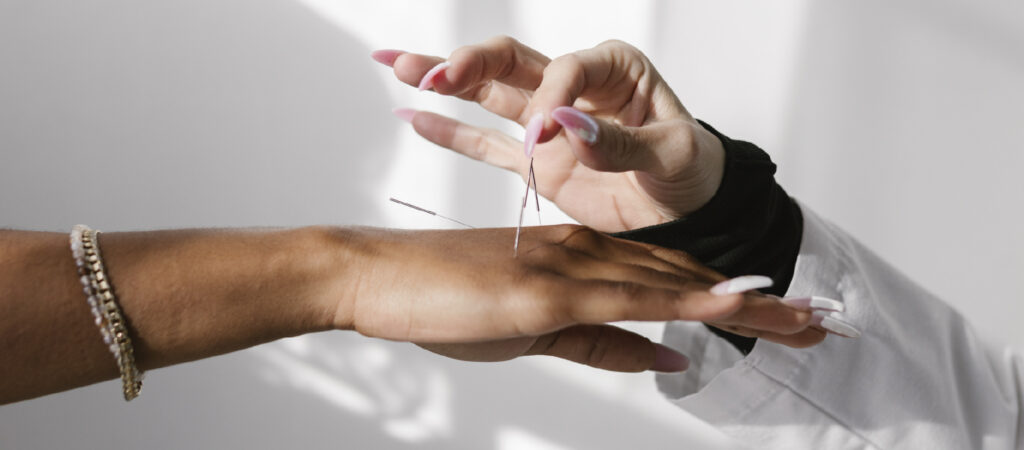6 Tips for Dealing With PMDD

Medically reviewed by Susan Vachon, PA-C on February 24, 2022
Have you heard of premenstrual dysphoric disorder (PMDD)? It’s a condition some people suffer from the week or so before their period. Left unchecked, it can have significant negative impacts on your life.
PMDD symptoms range from intense mood swings to problems sleeping. Some women even find themselves discovering feelings of sadness and hopelessness. While there’s no cure for PMDD, there are some things you can do to lessen your symptoms. Don’t let PMDD take over your life! Try one or more of the following tips to see if you notice an improvement.
1. Change Your Diet
Eating a healthy diet is one of the most recommended ways to ease PMDD symptoms. What you eat plays a big role in how you feel. The biggest thing is to make sure you’re eating lots of fruits and vegetables, lean proteins, and whole grains.
Nurx offers prescription treatment for anxiety and depression for as little as $0 in copays or $25 per month without insurance.
Other dietary changes that have been linked to less severe PMDD symptoms are a reduction in salt and caffeine intake. To reduce your salt intake, you may have to cook your own foods, since most processed or prepared foods are packed with it. This can help to reduce bloating and breast tenderness.
Limiting caffeine means you’ll probably need to swap out your morning coffee with decaf. But before you complain too much, doing so can help you sleep better and better control your PMDD fatigue.
2. Reduce Your Stress
Research shows that stressful events can make PMDD symptoms worse. This is likely because the part of the brain that handles stress — the hypothalamic-pituitary-adrenal axis — becomes dysregulated. Since many of the symptoms of stress and PMDD are similar, it’s like having a double-dose of not-so-fun side effects.
So, you’ll want to do your best to make your life less stressful. There are plenty of ways to do this! You might try guided meditation to help stay grounded in the present moment. This can ease you into relaxation and help you slow down your breathing.
Aromatherapy has also been linked to stress relief. In particular, chamomile, clary sage, geranium, lavender, neroli, and rose are all essential oils that can help reduce pain and make it easier for you to sleep. Other things, like taking a warm bath or practicing yoga, can all do wonders for easing your tension and helping you relax.
3. Get Regular Exercise
Getting more exercise doesn’t mean you have to become a gym rat. Nor does it mean you need to train for a marathon. All it means is that you can’t be a permanent couch potato.
According to physical activity guidelines from the U.S. Department of Health and Human Services, adults should get at least 150 minutes of moderate aerobic activity each week. Or, you can opt for 75 minutes of vigorous activity a week. A combination of these works as well.
Moderate aerobic activity can be as simple as taking a walk down the block. It also includes things like biking, swimming, and mowing the lawn. As for vigorous aerobic activity, that includes things like running, dancing, or fast-paced sports.
4. Take Some Vitamins
While research is a bit scant when it comes to taking vitamins for PMDD, many people have noted they feel better when supplementing on a regular basis. One vitamin that does seem to hold scientific promise, however, is vitamin B6. One study found that taking 100mg per day of vitamin B6 could be beneficial for treating PMDD symptoms, including depression.
Calcium is another one that has some solid support behind it. One study found it was able to reduce fatigue, cravings, and depression — both when it was consumed naturally in food and when taken as a supplement.
Two additional vitamins where the jury’s still out are magnesium and omega-3 and -6 fatty acids. Some science suggests that magnesium could help with migraines, while fatty acids might help with cramps.
Just to be safe, before starting on any vitamin supplement, it’s best to ask your doctor if it’s safe — or if it will help in your specific case.
5. Try Out Acupuncture
While it’s not so common in Western medicine, acupuncture has been all the rage in Chinese medicine for thousands of years. It involves sticking very thin needles just under the skin at strategic areas. While the Chinese traditionally used acupuncture to balance the flow of energy within the body, today’s doctors believe it works because it stimulates specific nerves and connective tissue.
For many people, acupuncture can provide relief for cramping, lower back pain, and migraines. However, there’s not a ton of science backing this treatment yet. Still, research suggests that it’s not a harmful practice, so if you’re looking for some relief, it’s worth a shot.
6. Create a Self-Care Box
Here’s the thing — if you know you’re probably not going to feel great once a month, you might as well indulge yourself. Try creating a self-care box before your PMDD symptoms kick in that will help comfort you.
This doesn’t have to be lavish or decadent. Instead, just fill it with things that will help you laugh and relax. As an example, maybe you could print out pictures of your favorite memes or gather some pictures of fun times you and your friends had.
You might even throw in a journal for recording your thoughts, some chocolate for nibbling on, cozy bath bombs, or your favorite DVD so you can have a movie night. Try to prep these boxes a few months in advance so they’re more of a surprise when you open them.
Your Doctor May Recommend Additional Treatments
While you can try out most of the above tips on your own, if you find they aren’t helping, don’t be afraid to reach out for more help. PMDD is a serious and chronic condition, and there’s no need for you to keep suffering.
When you work with your doctor or a medical professional, together, you can devise a treatment plan that eases your symptoms. They may be able to prescribe birth control pills or antidepressants that help you feel more like yourself during that dreaded time of the month.
This blog provides information about telemedicine, health and related subjects. The blog content and any linked materials herein are not intended to be, and should not be construed as a substitute for, medical or healthcare advice, diagnosis or treatment. Any reader or person with a medical concern should consult with an appropriately-licensed physician or other healthcare provider. This blog is provided purely for informational purposes.



